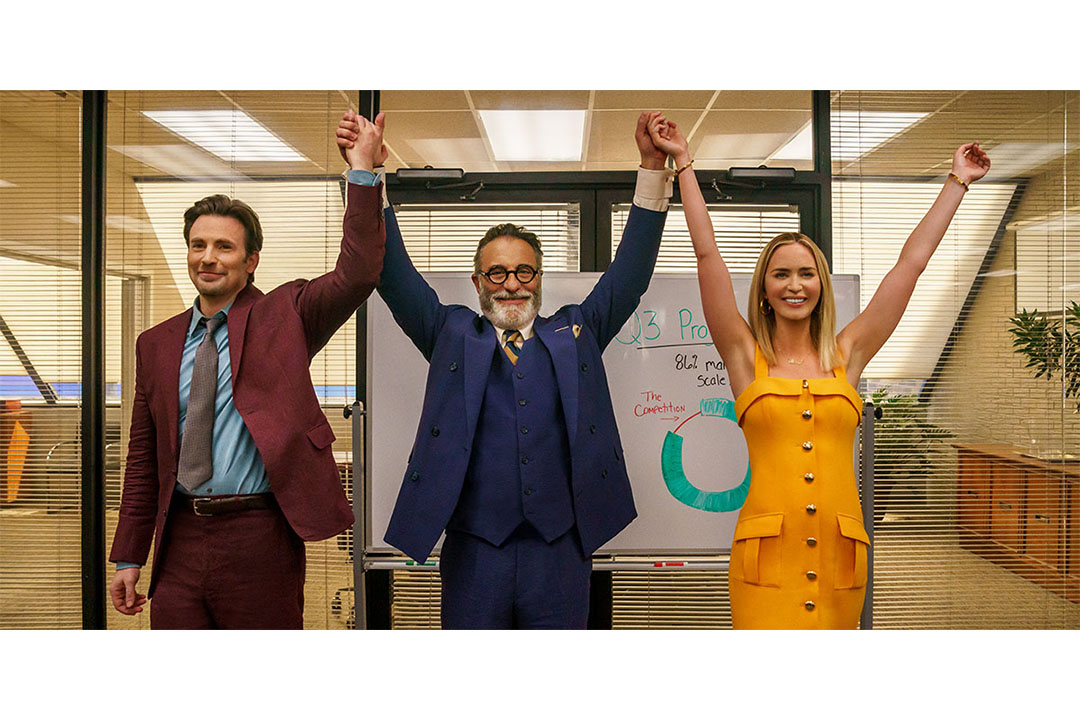On September 11, Pain Hustlers, directed by David Yates and starring Emily Blunt and Chris Evans, premiered at the Toronto International Film Festival. The story, which is adapted from Evan Hughes’ book Pain Hustlers: Crime and Punishment at an Opioid Startup, is inspired by the role real-life pharmaceutical company Insys played in the opioid crisis.
Liza Drake (Emily Blunt) is a single mom struggling to make ends meet after losing her job at a strip club. When she meets Pete Brenner (Chris Evans) by chance, she manages to land a job at Zanna Pharmaceuticals, a shady, failing startup peddling a fentanyl-based pain medication. She helps develop the startup into one of the world’s most successful pharma companies, but the human cost of her actions slowly starts to catch up with her.
Pain Hustlers appears as a big change of pace for writer Wells Tower, for whom Pain Hustlers marks his screenwriting debut and for Yates, who spent the last 16 years directing the Harry Potter and Fantastic Beasts movies. Yates, however, has actually worked on more realist projects dealing with social justice topics in the past. He has directed two television series, State of Play (2003) and Sex Traffic (2004), both investigative political thrillers. In an interview with The Varsity, Yates spoke to the importance of interviewing victims of the opioid crisis and their families to inform the film, a research process he undertook with Blunt.
Both Blunt and Evans’ roles are also rather unconventional in their repertoire. Evans — who is well-known for his role as Captain America — has dabbled in seedy characters such as Knives Out’s Hugh Ransom Drysdale before, but after his iconic run as Marvel’s golden boy, morally gray characters still read as a step outside the box for him.
Meanwhile, Yates and Blunt embraced the chance to include a seedy woman character for once: “You know what, David?” Blunt reportedly said to Yates in an interview with Comic Book Resources. “I’m so sick of seeing leading female characters who have to be so honorable and straightforward.”
Stylistically, it’s obvious who Pain Hustlers draws inspiration from: its quirky freeze-frames, flash-backs and flash-forwards, and voice-over explanations of technical terms will ring major bells for anyone familiar with Adam McKay’s 2015 The Big Short. The film is interspersed with black-and-white confessionals from its characters, who are presumably being interviewed for a documentary after the fact; these moments of characters directly addressing the camera to explain their past actions also conjure faint memories of Margot Robbie explaining economics in a bathtub. The score is pounding and sharply punctuates the several montages of Drake and Brenner doing what they presumably do best: scamming people. The film uses slow motion both for dramatic effect and, early on in the film, as an occasional replacement for freeze-frames while narration plays.
But ultimately, these stylistic quirks end up more distracting than anything else. While Blunt truly puts her all into her performance of Liza, Pain Hustler’s similarities to stories like The Big Short start and end with Yates’ McKay-like stylings. Tower’s amateurism at screenwriting shows; he doesn’t seem to know how to make characters express that they feel bad without having them say, out loud, “I feel bad,” or how to build romantic tension between two characters without having one of them ask to see the other’s tits out of nowhere. In fiction, these things can be developed naturally in narration; while Tower seemingly recognizes that it would be a mistake to develop the most important moments of the movie in voice-over, his dialogue simply isn’t strong enough to make the development of his relationships an interesting watch.
While Evans also does his best, he is given little to work with. Though the movie sometimes emphasizes how as Brenner begins to humanize Drake, it complicates their transactional relationship, this doesn’t actually become a major part of the movie. In fact, Evans is barely in most of the major scenes in Pain Hustlers. The film’s synopsis promising something it doesn’t deliver is a recurring theme here; while Drake’s daughter Phoebe (Chloe Coleman) has epilepsy, it’s only made relevant in a few niche segments of the plot; while Drake does rise to the top of the fentanyl-peddling business, her success is only ever shown to be a product of luck, rather than actual skill; the list goes on.
Yates and Tower consistently confuse putting something in their movie with having a movie that’s about that thing. Everything listed in the film’s trailer and synopsis technically happens in the movie, but the plot development consistently feels like a clunky obligation. Tower and Yates rush through scenes to reach the relief of the next montage or straight-forward confessional, where they can just have their characters tell you what they’re thinking.
Overall, Pain Hustlers clearly knows what it wants to be: a sharp, fun satire of what damaged people with messed-up families will do for money. But Yates and Tower don’t seem to know how to get there in any respect. As Pain Hustlers joins the growing ranks of satirical fiction about capitalism and morally dubious rich people — such as Glass Onion, The Menu, Infinity Pool, Succession — it’s by far one of the weakest and most timid of the genre.



No comments to display.